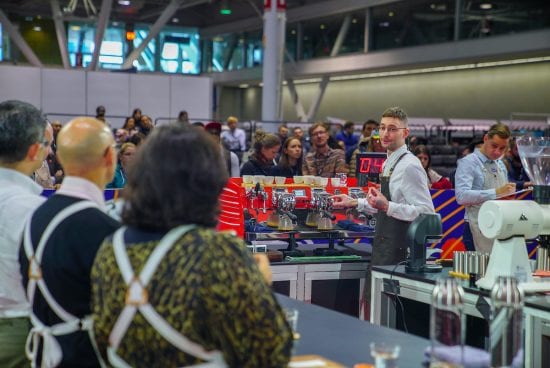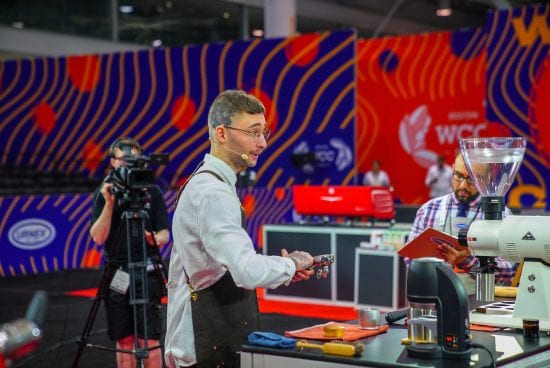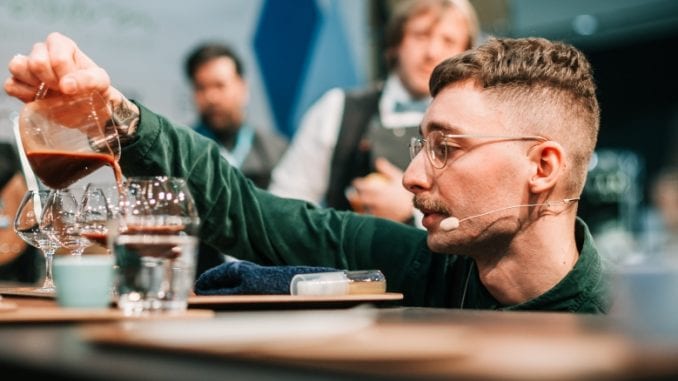
Wojtek Bialczak is the head roaster for Five Elephant and the fifth-place finisher at this year’s World Barista Championship—he chats juggling parenthood, a full-time job, and fitting in practice time.
BY CAROLINE CORMIER
SPECIAL TO BARISTA MAGAZINE ONLINE
Cover photo by Sinan Muslu
Originally from Poland, Wojtek Bialczak has been working at the Five Elephant Coffee Roastery in Berlin as the head roaster since 2016. In this interview, he tells us about launching his coffee career in Warsaw, his past competition experiences, and how he became the 2019 German barista champion.
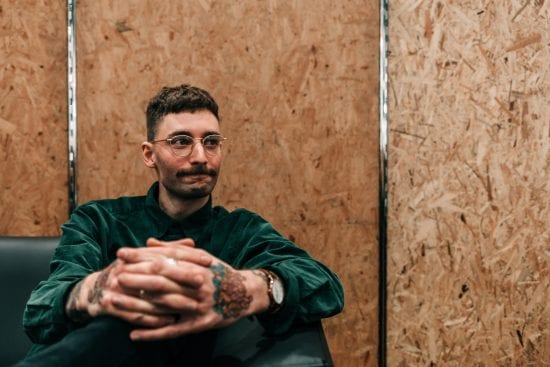
Wojtek represented Germany in the World Barista Championship in Boston in April, and took fifth place using a unique coffee called Coffea eugenioides, a parent varietal of Arabia noted for its intense sweetness and nearly absent bitterness due to its low caffeine content, from Finca Las Nubes in Colombia.
Caroline Cormier: Let’s start at the beginning. Can you tell us how you first got started in the coffee industry?
Wojtek Bialczak: Well, I’ve been working in the coffee industry for six or seven years already. But, to be honest, I wasn’t really interested in coffee before I started working with it. While I was studying in Warsaw, I took a side job as a barista at Ministerstwo Kawy. At the time, I didn’t even drink coffee. I just started working there because it seemed like a nice place to work. They had great staff, including a team of excellent baristas who were also taking part in competitions. It was at Ministerstwo Kawy Mthat I first got interested in coffee. After about six months working there, I signed up for my first barista competition.
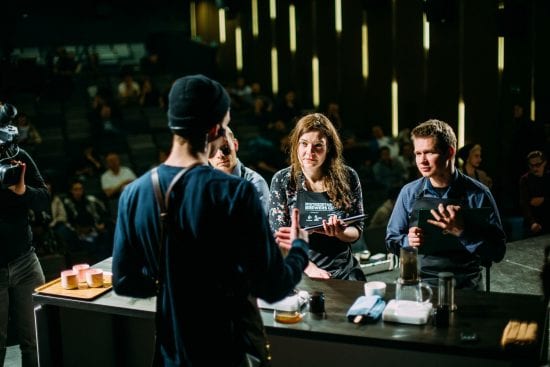
What was your first competition like?
My first barista competition was in Poland and I really didn’t know what to expect. I just signed up and I went with some of my colleagues. At the competition, I didn’t even get to the finals, mainly because I really didn’t understand the whole process. In fact, I wouldn’t win anything for the next few years, but I learned a lot each year and gained more experience along the way. These early competitions definitely helped me get to where I am today.
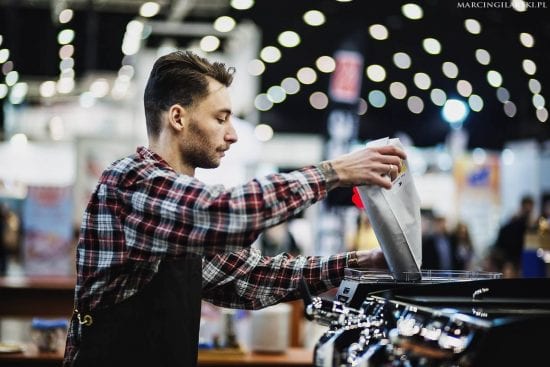
What do you think that you’ve learned along the way that has helped you better prepare for competitions?
Well, I have to tell you it’s really difficult to make 12 drinks in 15 minutes, while also talking about the coffee and the process. For my most recent competition in Germany, I practiced this combination a lot. I was inviting baristas from our shops in Berlin every evening to come and watch me. This really helped. Each time I went through my routine, I was getting better, faster, and more comfortable competing in front of people.
Of course, it’s clear that your hard work has finally paid off. This year you were named the 2019 German barista champion. What was that like?
Actually, I still can’t believe it happened! It’s funny because I decided to compete in Germany just two months before the event. Before this, I competed three times in Poland and I’d placed third twice. In one case, it was because I was 58 seconds over the allotted time. I’ve lived and worked in Germany for four years now, so I figured I should see how things would go at a competition in Germany. So, I signed up, and I won! Of course, my goal was to go to the world championships and test my skills there, so this is a really great opportunity.
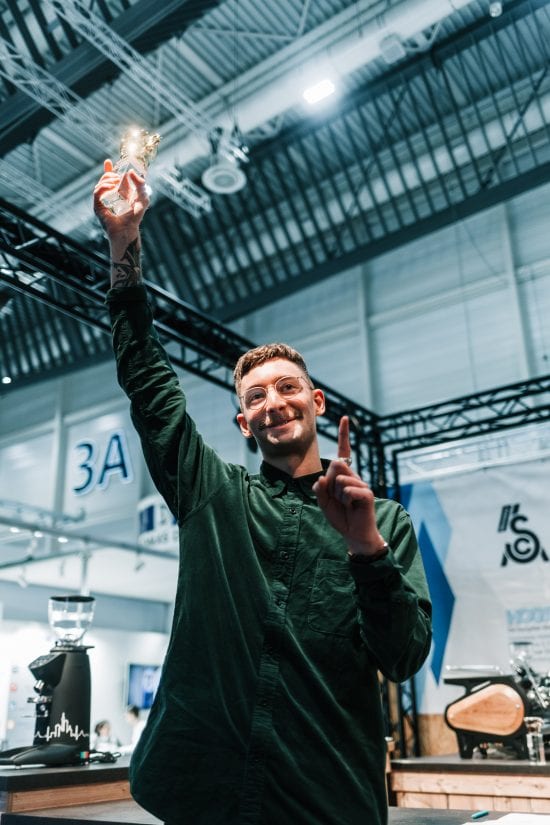
You used a rather unique and rare kind of coffee in the competition. How did you first discover Coffea eugenioides and what made you decide to work with it?
I used a coffee that I was introduced to last June while I was competing at the Fushan Cup International Barista Competition in Hainan, China. It’s basically a competition organized by the People’s Government of Hainan Province to engage both Chinese and international baristas, as well as to showcase Fushan as a coffee-producing region. While I was there, a fellow barista from Colombia, Mauricio Romero, had placed second using a Coffea eugenioides. Returning to Germany, I got a sample of the uniquely sweet Colombian bean. I just fell in love with it. I’d never tasted coffee like this before.
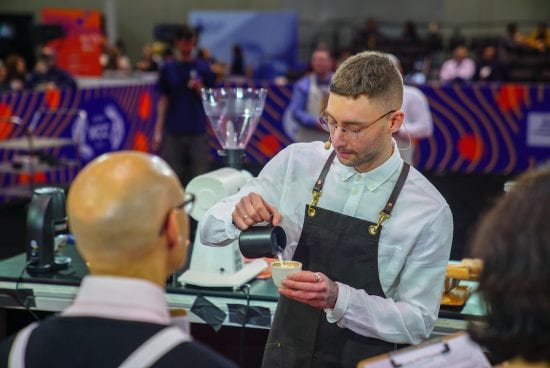
In the meantime, you’ve continued in your role at Five Elephant in Berlin. What’s it like to be the head roaster there? Can you tell us a bit about your day-to-day?
The first thing, of course, is production. At the moment, we roast up to four days a week. This takes up most of my time. After that, we need to do quality control. This takes almost another entire day. From time to time, we need to buy some green coffee, which I am also part of as well. Additionally, I am also in charge of maintaining stock and numbers.
It’s a very busy job and, actually, right now, we are currently looking to have another roaster join our team. It’s only two of us and it would be nice to have some help. Once we’ve hired someone, I’ll be responsible for training them.
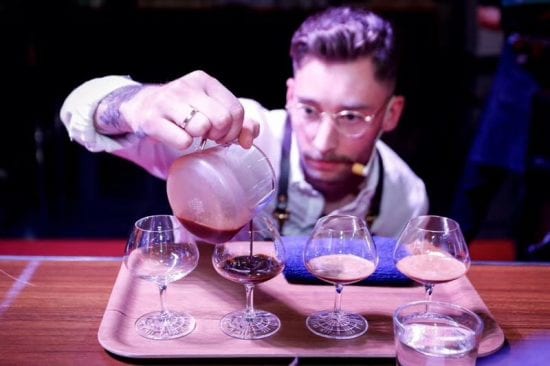
As you can see, my days are quite full. My preparation for competitions, then, takes place in the evenings. After I’ve put my little boy to bed, I head back to the roastery for some practice.
Why did you decide to take up roasting?
I just felt like there was so much more to learn about coffee. I have been a barista, barista trainer, and a maintenance manager, taking care of espresso and roasting machines. Eventually I got the opportunity to start roasting. For a lot of baristas, going into roasting feels like a natural step. However, I think that most of them wouldn’t actually like it. In the shop, you get to interact with customers, but in the roastery it’s just you and the machine. Not to mention, the coffee sacks are heavy and dirty. I really like it, but I think it’s not for everyone.
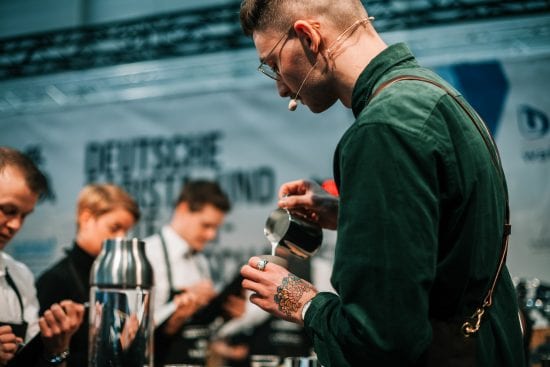
Since you’ve worked in both Warsaw and Berlin, can you tell us a little bit about the coffee scenes in these two capital cities?
Overall, I think that people in Warsaw are a bit more open and excited about this whole “third wave.” Or, perhaps it just feels that way as I’m not there anymore.
Anyway, I was really surprised when I moved to Berlin and started working for a well-known roastery because most of the baristas didn’t really know so much about coffee and weren’t that interested in learning more. Whereas back in Warsaw, most of the baristas that I knew who were working with coffee were doing so because they were really passionate about it. Perhaps part of the reason is because in Poland barista wages are really low, so if you are working with it, you have to really like it.
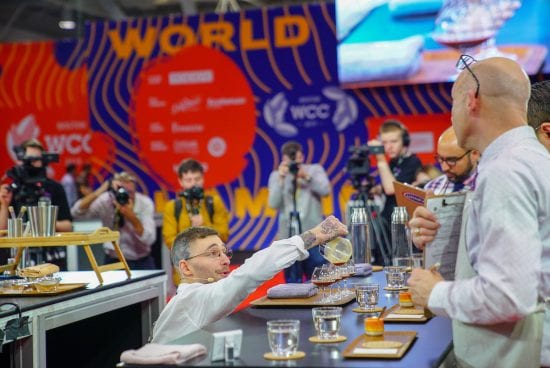
Don’t get me wrong, though, there are many baristas in Berlin who are crazy about coffee as well. It’s just different.
When you visit your local coffee shop, can you tell us what you’re most likely to order?
It would be an espresso or filter coffee. Or, perhaps, even something that isn’t coffee at all! I’m always open to trying new things and, right now, I am particularly excited about coffee cocktails. I would love to see these being offered more often!
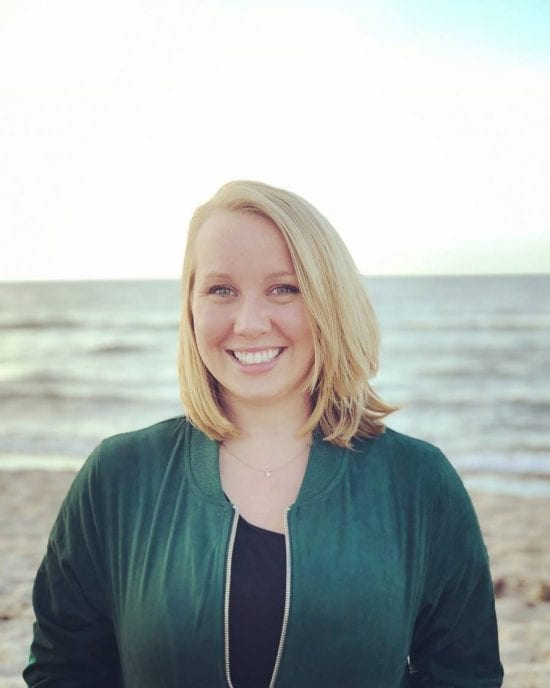
ABOUT THE AUTHOR
Caroline Cormier is a freelance writer from Canada. She currently lives in Berlin, where you can find her digging through archives to discover forgotten stories of the past for her Ph.D., exploring the city’s art and culture scene, or simply enjoying a good cup of coffee at a local café or farmers market.

